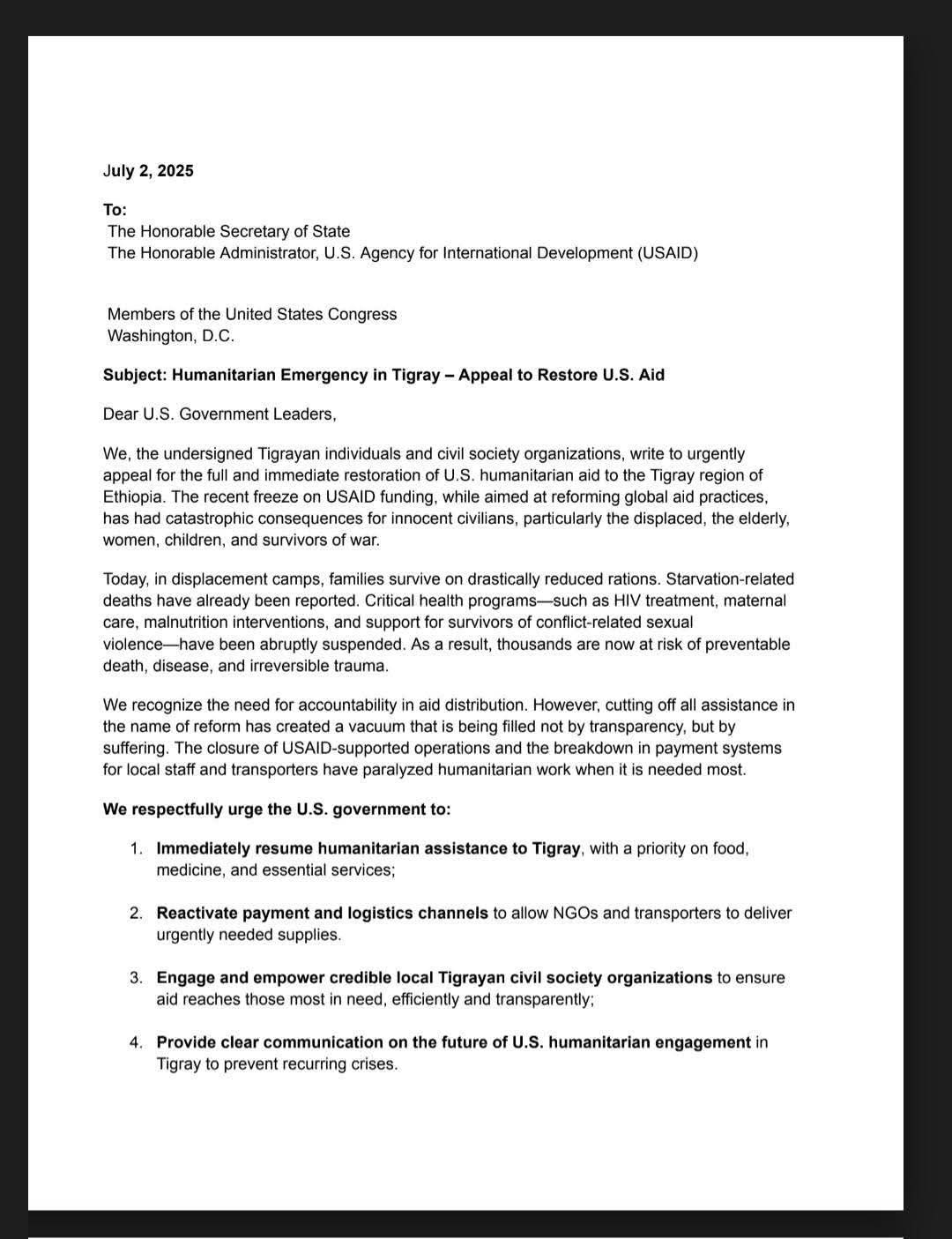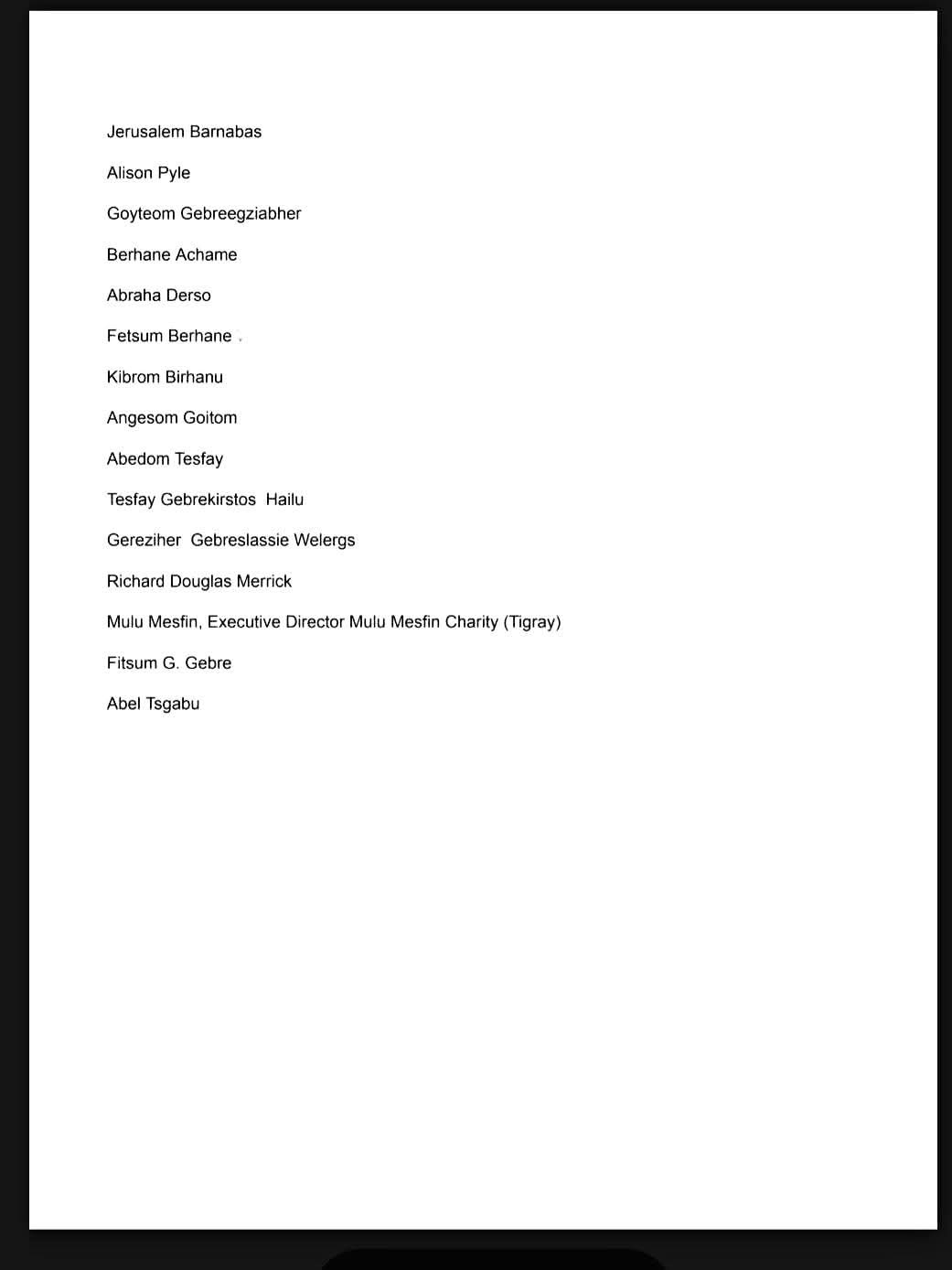Diplomatic Analysis: U.S. Engagement in the Humanitarian Emergency in Tigray
Background
The humanitarian crisis in the Tigray region of Ethiopia continues to present a significant challenge to international actors, including the United States. The recent suspension of USAID operations in Tigray, intended to address concerns of aid mismanagement, has exacerbated food insecurity, disrupted essential health services, and intensified the suffering of displaced populations. In response, society groups and individuals have issued formal appeals urging the U.S. government to restore humanitarian assistance.
U.S. Diplomatic Position
The United States has consistently maintained the following principles in its engagement with Ethiopia:
-
Respect for Ethiopia’s Sovereignty and Territorial Integrity:
The U.S. recognises Eritrea as a regional state within the Federal Democratic Republic of Ethiopia, not an independent entity. There is no indication that the U.S. is considering a shift in this position. -
Humanitarian Neutrality:
U.S. policy typically separates humanitarian assistance from political recognition. Humanitarian engagement in Tigray would be seen as an effort to save civilian lives, not as political interference or support for any separatist agenda. -
Accountability in Aid Distribution:
The suspension, diversion of supply, and diversions of aid channels. The U.S. drove the suspension of aid, likely insisting on reforms, monitoring mechanisms, and local and international transparency before fully resuming assistance.
Strategic Considerations for the U.S.
1. Balancing Humanitarian Response and Sovereignty Concerns
- Humanitarian Imperative: Immediate resumption of aid aligns with U.S. values and its global humanitarian leadership role.
- Diplomatic Sensitivity: The U.S. must avoid actions that could be interpreted as undermining the Ethiopian federal government or encouraging regional separatism.
2. Regional Stability
- Prolonged humanitarian crises in Tigray can destabilise the Horn of Africa and potentially spill over into neighbouring regions, increasing the risk of renewed conflict.
- Restoring aid could contribute to stabilisation and further displacement, including migration pressures toward Europe and North America.
3. Geopolitical Competition
- China, Russia, and Turkey are increasing their influence in Ethiopia. If the U.S. disengages or delays humanitarian intervention, these actors may fill the diplomatic and aid vacuum, potentially shifting Ethiopia’s long-term alliances.
4. Engagement with Civil Society
- The appeal to engage local Tigrayan civil society organisations. An opportunity to strengthen grassroots accountability, encourage local solutions, and potentially reduce corruption in aid distribution channels.
5. Messaging to the Ethiopian Government
- The U.S. can frame the resumption of aid not as a political concession but as a necessary humanitarian intervention with conditions for transparency that also serve Ethiopia’s national interests.
- A diplomatic channel can emphasise that failing to address the humanitarian crisis would negatively impact the government’s international image.
Recommended U.S. Diplomatic Actions
-
Resume Humanitarian Aid Immediately
Focus on life-saving interventions while establishing strict monitoring protocols and third-party verification systems. -
Initiate a Diplomatic Dialogue with the Ethiopian Federal Government
Stress that the humanitarian engagement is complementary to Ethiopia’s sovereignty and that the aid is aimed at civilians, not political entities. -
Support Capacity-Building for Local Civil Society
Empower credible, accountable local organisations to participate in aid distribution, thereby reducing the risk of misappropriation and increasing local ownership. -
Maintain Diplomatic Neutrality on Internal Ethiopian Political Affairs
Reaffirm U.S. support for Ethiopia’s territorial integrity while encouraging inclusive governance and national reconciliation. -
Coordinate with International Partners and Multilateral Agencies
Engage with the UN, the African Union, and trusted NGOs to ensure that aid delivery is transparent, efficient, and resistant to politicisation
The United States must walk a careful, diplomatic line: restore urgent aid to Tigray to alleviate suffering while respecting Ethiopia’s sovereignty and avoiding the perception of foreign interference. The key to a sustainable engagement lies in transparent aid mechanisms, support for local civil society, and constructive diplomacy with the federal government and regional actors.



No comments:
Post a Comment